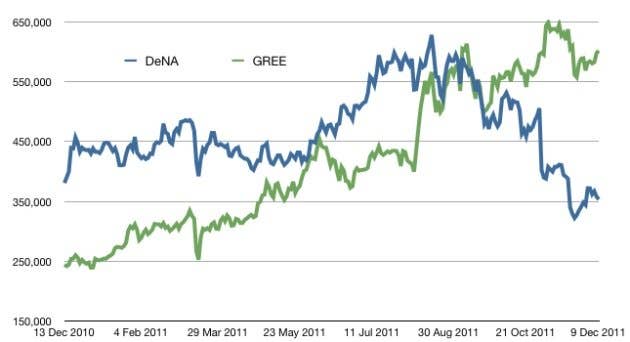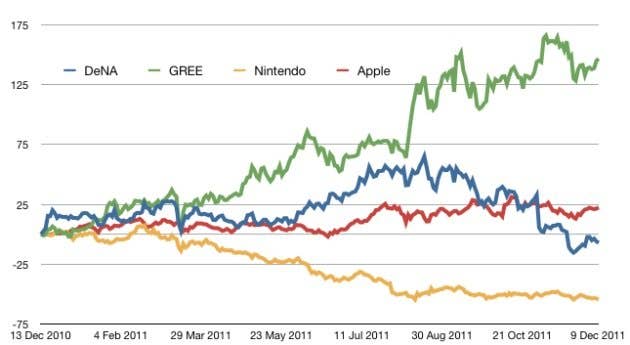Stock Ticker: DeNA vs Gree
Tracking the performance and prospects for Japan's mobile gaming giants
Here's the net result - this chart shows what's happened to the valuations, rather than the share prices, of the two companies over the past year. DeNA starts out as comfortably the larger company, but right now, Japan's stock market values Gree more highly.

Of course, we need to recognise that what the stock market wants to hear isn't necessarily what will actually work in the marketplace. Gree's investment in OpenFeint and its consequent focus on overseas engagement is music to the ears of traders, but it's not a strategy without risk - especially since OpenFeint itself is a platform whose existence could become very precarious very quickly indeed. Right now, its success on iOS seems to be largely a consequence of some extremely poor design decisions and atypical lack of focus on Apple's part, with the GameCenter service being unappealing to consumers and developers alike. On Android, OpenFeint's position is more secure, but that market is also wide open for competitors - and it's interesting in that context to wonder where Sony sees PlayStation Suite being positioned in future.
DeNA's position, meanwhile, has upsides that aren't immediately apparent - but which the market clearly understands, given that it is still (just about) outperforming the Nikkei 225. The company's local focus plays to its strengths, and its engagement with developers with global reputations may allow it to enter the western market in a manner that's spearheaded by high-profile game titles rather than a service brand. It's worth noting that gaming SNS brands are a fairly abstract thing from a western gamer's perspective anyway; smartphone users almost inevitably have social networks like Facebook and Twitter on their devices already, and few will be remotely interested in the potential to add to that haul with a gaming-specific service. Piggybacking on popular games may be a better business, in the long run, than trying to promote a gaming SNS.
As a final piece of data to throw into the mix, the following graph gives a few interesting contrasts. DeNA and Gree are both fascinating products of a mobile market that's very different from its western equivalents; having grown in this enclosed hothouse environment, they're arguably the biggest and best examples we have of the purely mobile-based gaming company. As such, I thought it would be interesting to give comparison points with the leader in "traditional" handheld gaming, Nintendo, and the market pioneer in smartphones, Apple.

One thing that's not immediately clear from this graph, though, is the scale of the companies involved. Either Apple or Nintendo could handily swallow one of the other firms here whole - and that in itself raises interesting questions. Apple's GameCenter service is neglected and unloved, while OpenFeint's operator has been a market darling even in the toughest of economic conditions. Nintendo, meanwhile, is constantly told that it needs to engage with mobile gaming to survive (an idea I don't really believe, I should add), and here's a platform operator and globally recognised developer of mobile software on its doorstep.
This is purely speculative, of course, not least since neither Apple nor Nintendo are traditionally acquisitive companies, preferring to pick up small firms with interesting technology or to develop their own systems in-house. Equally, I don't think that acquisition is an exit strategy for either Gree or DeNA. I do, however, think that the new year is going to be extremely important for both companies. Gree's performance has clearly outpaced DeNA in 2011, but next year will have to bring concrete figures rather than high anticipation - from both parties.
